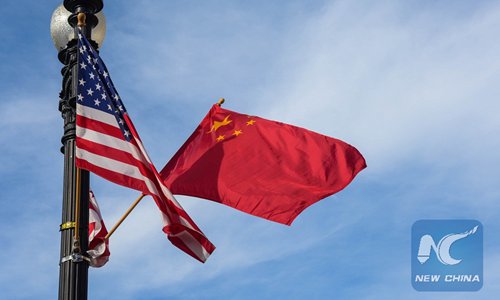HOME >> BUSINESS
US multinational companies long for an early end to trade war
By Song Lin Source:Global Times Published: 2019/9/13 16:32:19

Photo: xinhua
Representatives of US multinational companies are increasingly against tariff hikes on trade, and hope the China-US trade conflict could end so that their business operation could get back to normal.
Chinese Vice Premier Liu He, who is also China's top trade envoy, met Thursday with Evan Greenberg, chairman of the US-China Business Council (USCBC) in Beijing, Xinhua News Agency reported. Liu said China and US working-level officials will meet next week to discuss trade balance, market access, investors' protection and other issues between the two economies.
The two countries seem to have softened their stance lately as both economies face mounting downturn pressure. Vice Premier Liu He is expected to head a high-level trade group to Washington in October to kick off another round of high-profile trade talks. The stakes are high as the global economy is now struggling to avoid a recession.
Greenberg said the US business sector does not want to see a hike in tariffs, and he hopes that the two countries will solve their differences through consultations which will bring bilateral trade back to normal. Greenberg noted the USCBC is willing to play a positive role in this regard.
Some US companies have encountered diminishing market share and other operational difficulties thanks to the trade war, and they have called for a policy change in Washington, experts said on Friday.
"[Profit losses] are realistic problems, and the economic damage may not be restored if the trade war continues to escalate," Bai Ming, a research fellow at the Chinese Academy of International Trade and Economic Cooperation, told the Global Times.
According to a report of USCBC, "trade tensions with China hit US goods exports in 2018, down 7 percent from the previous year. Services exports increased, but at a slower pace than in previous years. Despite these challenges, trade with China continued to contribute to US economic growth, with US exports to China supporting more than 1.1 million American jobs."
"The economies of China and the US have been intertwined deeply and enjoyed massive mutual benefits, so trade war is hurting both," Mei Xinyu, a research fellow at the Chinese Academy of International Trade and Economic Cooperation, told the Global Times on Friday.
The rising oppositional voice of US business sectors now put heavier pressure on US authorities too, Mei said.
To find a way out, top advisers of US President Donald Trump are reportedly busy in seeking an escape hatch for incoming tariff hikes in October and December, which if not averted will inevitably exacerbate economic pains, the Politico reported on Thursday.
Some Trump advisers have argued that the economic pain is real and acute, which must be mitigated prior to 2020, the US presidential election year, the report said.
According to CNBC, US President Trump would possibly consider an interim trade deal with China. "A lot of people are talking about it, I see a lot of analysts are saying an interim deal — meaning we'll do pieces of it, the easy ones first," Trump said.
Both sides' efforts have been made in the recent days to pave the way for the 13th round China-US trade consultations. Beijing on Wednesday announced a plan for certain US imports and companies to file for exemptions from Chinese tariffs.
Trump on Thursday said in a twitter post that they have agreed, as a gesture of goodwill, to move the increased tariffs on $250 billion in goods (25 percent to 30 percent) from October 1 to 15.
Mei told the Global Times China has been striving to get a good result from the China-US trade negotiations, and preparing for the worst at the same time.
Posted in: ECONOMY